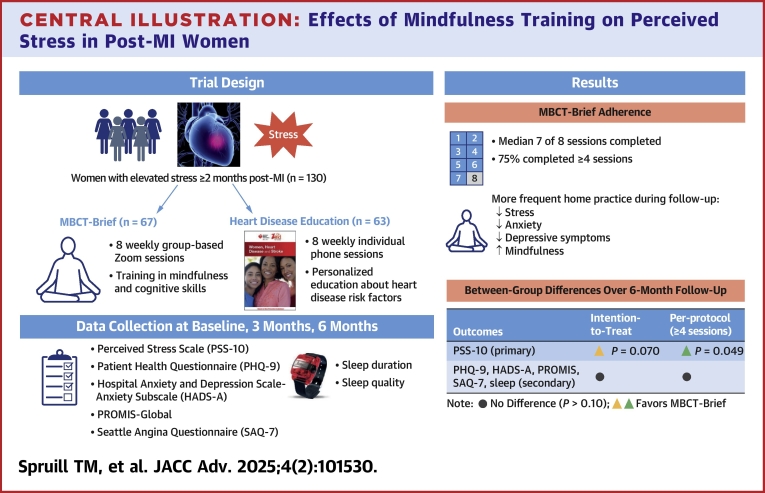
By John M. de Castro, Ph.D.
In today’s Research News article “Brief Mindfulness-Based Cognitive Therapy in Women With Myocardial Infarction: Results of a Multicenter Randomized Controlled Trial” (See summary below or view the full text of the study at: https://pmc.ncbi.nlm.nih.gov/articles/PMC11786073/ ) Spruill and colleagues examined the effectiveness of mindfulness training (Mindfulness Based Cognitive Therapy – MBCT) on stress levels of women diagnosed with myocardial infarction. They found that in comparison to an active control condition (heart disease education) the women who received mindfulness training had significantly lower perceived stress levels and the more they practiced the greater the reductions in stress, anxiety, and depression.
Hence, mindfulness improves the mental health of women with heart disease.
CMCS – Center for Mindfulness and Contemplative Studies
This and other Contemplative Studies posts are also available on the Contemplative Studies Blog http://contemplative-studies.org
Study Summary
Spruill TM, Park C, Kalinowski J, Arabadjian ME, Xia Y, Shallcross AJ, Visvanathan P, Smilowitz NR, Hausvater A, Bangalore S, Zhong H, Park K, Mehta PK, Thomas DK, Trost J, Bainey KR, Heydari B, Wei J, Dickson VV, Ogedegbe G, Berger JS, Hochman JS, Reynolds HR. Brief Mindfulness-Based Cognitive Therapy in Women With Myocardial Infarction: Results of a Multicenter Randomized Controlled Trial. JACC Adv. 2025 Jan 16;4(2):101530. doi: 10.1016/j.jacadv.2024.101530. PMID: 39898341; PMCID: PMC11786073.
Abstract
Background
Elevated perceived stress is associated with adverse outcomes following myocardial infarction (MI) and may account for poorer recovery among women vs men.
Objectives
This randomized controlled trial tested effects of a mindfulness-based intervention on stress levels among women with MI.
Methods
Women with elevated stress (Perceived Stress Scale [PSS-4]≥6) at least 2 months after MI were enrolled from 12 hospitals in the United States and Canada and via community advertising. Participants were randomized to a remotely delivered mindfulness intervention (MBCT-Brief) or heart disease education, both 8 weeks long. Follow-up was 6 months. Changes in stress (PSS-10; primary outcome) and secondary outcomes (depressive symptoms, anxiety, quality of life, disease-specific health status, actigraphy-assessed sleep) were compared between groups.
Results
The sample included 130 women with MI (mean age 59.8 ± 12.8 years, 34% racial/ethnic minorities). In intention-to-treat analysis, PSS-10 scores declined in the MBCT-Brief arm (−0.52 [95% CI: −0.77 to −0.28]) but not the heart disease education arm (−0.19 [95% CI: −0.45 to 0.06]; group×time interaction P = 0.070). The effect was stronger in per-protocol analysis of participants who completed ≥4 intervention sessions (P = 0.049). There were no significant differences in secondary outcomes in intention-to-treat or per-protocol analyses. Within the MBCT-Brief arm, more frequent mindfulness practice was associated with greater reductions in stress (P = 0.007), depressive symptoms (P = 0.017), and anxiety (P = 0.036).
Conclusions
MBCT-Brief was associated with greater 6-month reductions in stress than an active control among adherent participants. More frequent mindfulness practice was associated with greater improvements in psychological outcomes. Strategies to engage women with MI in mindfulness training and support regular home practice may enhance these effects.